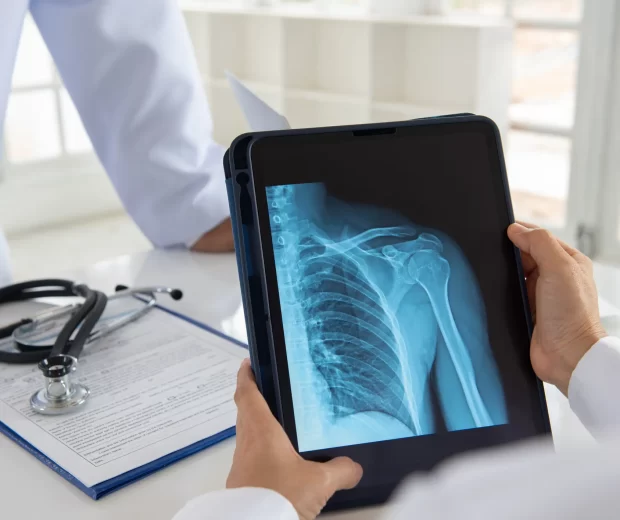Investigation of chest pain most of the time requires three main tests
- Electrocardiogram (ECG)
- Cardiac Biomarkers or Enzymes
- Chest-X-Ray
Electrocardiogram (ECG)
ECG is the single most important test for evaluating chest pain. It helps in excluding life threatening underlying heart disorders which can be fatal. Patients having chest pain with normal ECG chances of Myocardial Infarction (MI) is around 10 percent while some studies say the number is around 1-2 percent. So if the ECG is normal it is highly unlikely that the chest pain if of cardiovascular origin.
ECG should be done immediately after stabilizing the patient and recording vitals.


Most patients with MI will have abnormal ECG findings, 50% of them will have diagnostic ECG changes (ST segment elevation with Q waves) while 30% can have ECG findings consistent with angina (ST segment depression with or without T wave inversion). Any ECG finding is considered to be a new one until proven otherwise by an old ECG.
Apart from cardiovascular origin a patient presenting with chest pain can have abnormal ECG findings especially in cases of:
Aortic dissection– Non specific changes, while 1-2% of cases have acute ST segment elevation
Pulmonary embolism– S wave in lead 1, Q wave in lead 3, T wave in lead 3
Electrolyte imbalance.
Cardiac Enzymes
Aspartate Transaminase, Lactate Dehydrogenase, Lactate dehydrogenase sub forms are no longer used as they are not specific for cardiac tissue and there delayed elevation does not help in early diagnosis of recent MI.
Creatine Kinase (CK) are found in brain, kidney, lungs and gastrointestinal tract, so they can be elevated in number of diseases involving these tissues like renal insufficiency, trauma, seizures.
Cardiac Troponins T, I, C are found in cardiac and straiated muscles. T & I isoforms for cardiac and skeletal muscles differ they are also called as cardiac troponins. Both cardiac troponins have similar sensitivity and specificity detecting myocardial injury and are the preferred markers for the diagnosis of myocardial injury. It should be noted that Cardiac troponin T might be elevated in some non cardiac conditions like polymyositis, dermatomyositis, renal disease.
Cardiac troponins maybe elevated as long as two weeks after an episode of MI thus making them excellent late markers of recent MI. If CK(MB) eve is normal with increased cardiac troponin the finding is suggestive of minor infarction or sustained minor myocardial damage. If both the markers are elevated the patient have had acute MI.
Chest X Ray
Every patient with chest pain should have chest X ray. The radiological test gives very important clue for any non cardiovascular causes of chest pain like pneumothorax, pneumomediatinum (esophageal rupture), pleural effusion, infiltrates, pneumonia. Aortic dissection shows up in chest x ray as widened mediastinum. Pulmonary embolism may be seen in a chest x ray with loss of lung volume or decreased vascular markings.
Other Tests
Arterial blood gas (ABG), BNP (for heart failure), Spiral CT scan etc

